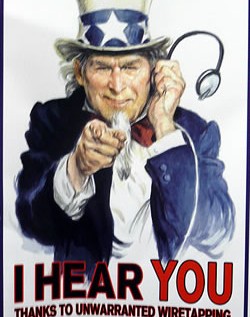Police State of Wiretapping the Web: Who Do THEY Want to Watch?


To celebrate National Cybersecurity Awareness Month, wouldn’t it be nice if our government stopped pushing wiretapping to increase our vulnerability? The warm fuzzy feeling of security and privacy seemed considerably less reassuring after FBI Director Robert Mueller called for more surveillance and legal abilities to intercept communications. He stated, “Some have suggested there is an inherent tension between protecting national security and preserving civil liberties. I do disagree. Yes, we have a right to privacy. But we also have a right to ride the subways without the threat of bombings….It is not a question of conflict; it is a question of balance.”
That “balance” was emphasized by Pulitzer Prize winning cartoonist Mark Fiore with his new Snuggly the Security Bear cartoon to reassure citizens about ubiquitous surveillance in America. The cute bear with a wickedly evil laugh begins with, “I’m friendly. Are you wiretap friendly?”
FBI’s Mueller spoke of enhanced public trust in the FBI, of how they want to “dispel myths about the FBI and the work we do.” This is the same FBI that used “questionable investigative techniques and improperly collected and retained First Amendment information” and now wants to require all encrypted communications systems to have backdoors for surveillance.
According to the annual wiretap report, encryption is rarely encountered during wiretaps and it has never stopped the government from collecting the evidence they need such as getting hold of a plain text copy of the communications.

Zero, zippy, negative, none…So who are “they” really interested in monitoring? Snuggly the Security Bear suggests, “If you want to know more than that, it’s a State Secret so you must be a terrorist…How do we know who to watch, unless we watch all of you!”
Why does law enforcement need more legal ability to wiretap? They can wait a few minutes and then obtain what they want after it is considered stored communication held by cloud computing providers like Microsoft or Google. Indiana University Law Professor Fred Cate testified, “Because most service providers do not disclose this information, Congress and the people have no reliable data to determine the scale of this form of electronic surveillance, which is likely to outnumber the 2,376 wiretap orders granted in 2009, and the 11,126 pen registers and 9,773 trap and trace orders granted in 2008.”
Security and privacy analysis Christopher Soghoian wrote about surveillance transparency, “And thus, we find ourselves in the same situation as 12 years ago, where law enforcement officials were making anecdotal claims for which no evidence existed to prove, or disprove them.” Soghoian’s work was mentioned in Certified Lies: Big Brother In Your Browser.
It’s not just the FBI pushing to wiretap encryption. Techdirt reported that the NSA “yelled” at the French government over sending out three strike warning letters. U.S. Intelligence agencies know the three strikes law will increase encryption usage and make it more difficult to spy on file-sharers and criminals. The NSA has a shady history of using unauthorized surveillance to eavesdrop and collect data like when they spied on wives, girlfriends and former President Bill Clinton.
The U.S. Marshal Service (USMS) also engages in electronic surveillance, but has special rules before wiretapping members of congress, governors, judges and VIPs. You can take a peek at the heavily redacted .pdf manual of internal rules that outline when and how the USMS uses electronic surveillance. The USMS said policies are “obsolete” and will be revised, but many sections starting on pages 22 – 25 are blacked out and on a *need to know* basis.
At the conference of intelligence experts, FBI’s Mueller more or less said the Net is evil. It’s used as “a means of social networking for like-minded extremists . . . including those who are not yet radicalized, but who may become so through the anonymity of cyberspace…In other words, the Internet has become a facilitator—even an accelerant—for terrorist and criminal activity.”
Who is an extremist not yet radicalized? A person who still believes in the U.S. Constitution and the Fourth Amendment which states: “The right of the people to be secure in their persons, houses, papers, and effects, against unreasonable searches and seizures, shall not be violated, and no Warrants shall issue, but upon probable cause, supported by Oath or affirmation, and particularly describing the place to be searched, and the persons or things to be seized.”
The lawless will find a way around the laws that limit the liberties of the general population. Are U.S. citizens to believe that the Snuggly Security Bear video best sums up the surveillance transparency of wiretapping? “We want to listen in and make you safer.” What will the Internet, privacy and civil liberties be like next year when we celebrate National Cybersecurity Awareness Month? As security expert Bruce Schneier blogged, “It’s bad civic hygiene to build technologies that could someday be used to facilitate a police state.”


